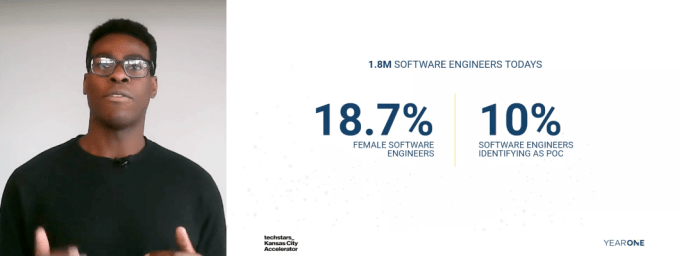With TechCrunch Disrupt happening last month, I fell behind on watching accelerator demo days. It’s time to correct that oversight.
In August and September, the Techstars network of startup accelerators held demo days for various classes of startups, grouped by either geographic location or focus. Kansas City, for example, or space.
The Exchange explores startups, markets and money. Read it every morning on Extra Crunch, or get The Exchange newsletter every Saturday.
With October upon us, there’s another crop of Techstars demo days around the corner. To prevent falling further behind, let’s take a look at a few startups from Techstars’ September cohorts (and two from August) this morning to get primed for what the accelerator collective and venture fund will get up to next.
 To find six favorites to share today, I dug through startups from Techstars’ Kansas City accelerator (full class here), its SportsTech Melbourne accelerator (full class here), its Toronto cohort (full class here), and its Tel Aviv location (full class here). You can find TechCrunch coverage of Techstars’ two space accelerators here, and their full classes here and here.
To find six favorites to share today, I dug through startups from Techstars’ Kansas City accelerator (full class here), its SportsTech Melbourne accelerator (full class here), its Toronto cohort (full class here), and its Tel Aviv location (full class here). You can find TechCrunch coverage of Techstars’ two space accelerators here, and their full classes here and here.
Before we jump in, this month Techstars has cohorts graduating from another five accelerators, including groups from LA, NYC, Atlanta and more. So, there will be no shortage of startups to look at in short order. With that, let’s get into some favorites from the the past groups.
Favorites and standouts
We’ll start with the Kansas City accelerator. Kansas City, where my parents are from, incidentally, is a locale best known for its culinary magic and musical history, not to mention a famous sports team or two. I was pleasantly surprised to find out that Techstars also had a foothold in the city.
Techstars claims that it has “proven companies can scale big and in the process, raise more than $100 million while located in the heart of America.” Well, then, what did the accelerator have on offer? A number of cool startups, happily. Oja Express is specialty grocery delivery, which was neat. It’s perhaps comparable to Chowbus, but for groceries. MuukTest also stood out, as anything developer-tools-related seems to be doing well these days.
But my favorite from the batch was YearOne, a startup that aims to provide companies access to diverse candidates from code schools. For any company looking to hire a more diverse engineering team, YearOne could prove incredibly useful.

Image Credits: Via the YearOne Techstars pitch
According to YearOne, 33,000 new code-school graduates will hit the market in 2020, a group that is around 150% as diverse as computer science graduates, or the current developer labor pool. The startup works with coding schools, vets candidates and supports them during their early time on the job. This makes their candidates “strong contributors on their way to midlevel engineering roles,” it claimed during its demo day pitch.
More diverse candidates for more companies? I dig it. YearOne charges $20,000 to companies for access to its developers, which is nothing compared to most hiring budgets.
Turning to the Techstars SportsTech Melbourne accelerator, what sort of startups were on offer during its demo day? A varied group, happily. Some wanted to help us get better at our favorite activity (A-Champs), or focus on our mental well-being (Arete) or cognitive ability (gameSense Sports). However, my favorite from the group was MyFavorito, which wants to let smaller sports franchises earn money from major brands.
Per its demo, when a fan of a club — no matter its size! — buys a product from a major brand that works with MyFavorito, they can select their favored team, granting it a small cut of the sale. This is somewhat brilliant as MyFavorito can act as an aggregator for both brands and teams. There are lots of fans of smaller teams out there. My local football club is testament to this.
Moving along to the Techstars Toronto accelerator, which is also a partnership with investing group Real Ventures, what did we find? While we both know that D2C companies are less in vogue than they once were, Fable makes super lovely products that I would buy if my house wasn’t already stuffed with more plates than people by a factor of around 20. ArtBoard Studio’s SaaS product to help folks create mockups is super cool as well.
But from the group, I liked Livelii (pronounced lively) the most. Livelii is a service that helps freelancers charge for their work, building into their invoices an extra charge that goes to pay for benefits and time off for the freelancer. To encourage quick payment, Livelii offers a 2% discount for invoices paid within a month. The startup is working with Canadian insurance company Manulife to offer group plans to freelancers. If clients are willing to pay the extra bit that Livelii charges to give freelancers more regular benefits, the system could really improve lives.

If this model works, it could make a lot of lives better. Image Credits: Livelii.
Next up: Techstars Tel Aviv. What stood out from this group? SenseIT, because, again, developers tools are super hot at the moment, and Hololink, because everyone is into no-code services these days. My favorite from the cohort was Albo, which wants to help landowners properly account for and sell their carbon credits. As my beloved California burns this year, it’s hard not to root for startups that want to make climate change even a little bit less impactful.
Finally, the space duo. I don’t know much about space other than what you can glean from reading hundreds of sci-fi novels over the years. So, from a very, very limited set of knowledge, the following two startups did stand out while I was parsing the larger group:
- Space Products and Innovation GmbH (SPiN): With a goal of simplifying space manufacturing, SPiN sells MAGIC, or a “Multipurpose Adapter Generic Interface Connector.” In short the startup’s technology helps connect disparate off-the-shelf parts on a satellite, allowing them to connect without additional software. This could help make satellites up to 40% cheaper. That’s a lot.
- SATIM: Ok so there’s a thing called SAR, or synthetic-aperture radar. It lets you check out the planet from a satellite even when it is nighttime, or cloudy. According to SATIM, SAR is great but hard as hell to use, taking a week to get through an image. This made SAR too expensive for most customers. SATIM, as you guessed, does SAR analysis without the human input. And it’s faster. If SATIM is correct about the growth of SAR data and SAR data analysis that is coming, it’s going to explode.
Check out each demo day page (linked in the intro) for more, as we only got to a fraction of the collected companies. After all, what’s more fun than looking at the startups of the world and trying to figure out which is going to have the biggest impact?
